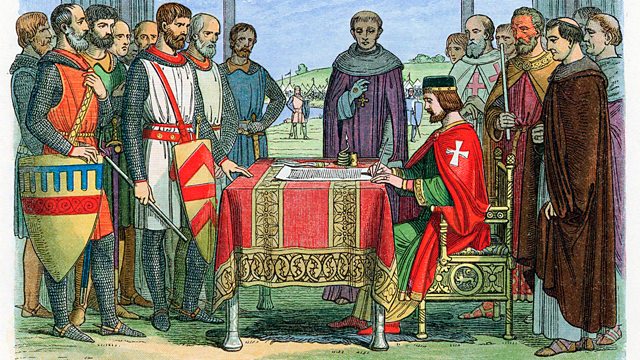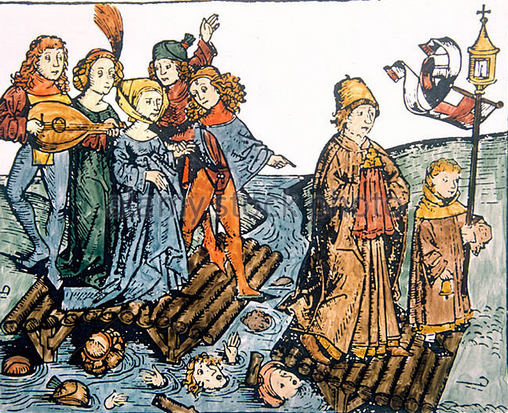

Himmel
-
Posts
11 -
Joined
-
Last visited
Content Type
Profiles
Personas
Wiki
Rules
War
Systems
Safety
Player Conduct
Forums
Forms
Posts posted by Himmel
-
-
"This is propaganda, not news!" Says man
0 -
The Beggar King and His Illusion
by Edward Baldwin

The current imperial line is a direct descendent of Horen and thus maintaining divine mandate to rule humanity and the Empire by virtue of both blood and the legacies of the Four Prophets from which they descend. Never before has mankind seen such a dynasty, whose rulers are both eclectic and capable. Never before have we seen one that has maintained its rule for so long, perhaps not since ancient times. The Fifth Empire has no doubt become obvious proof of the fundamental solidarity of mankind. Despite obvious mistakes, the length of the rules as well as the only ever peaceful transitions of the Orenian throne are a testament to the Fifth Empire's adherence to the human desire for peace and stability.
Only when the few grow discontent is the safety of the Empire threatened. The Lords that have rebelled against Oren are all weak and unimportant, and some of them, including de Amaury and Brawm, are internally divided. This is the nature of weaker folk, they wish to become strong and so they choose to ride the coattails of one who promises salvation from atrocity and oppression.
Yet where is the oppression? The Emperor sits in his throne, in his Palace and manages his Crownlands. He grants titles and makes certain the Empire maintains itself to the best of his ability, but never has he sent soldiers to threaten a vassal, or imposed overwhelming or unfair law or supervision. It has been a hallmark of the Johannean Emperors to largely permit vassal autonomy. Of course, autonomous vassals are more dangerous, especially when manipulated by bandits and disgraced vagabonds with nothing but chaotic purpose.
The Empire's contract is built on faith. The Emperor maintains fair relationships with his vassals, and the vassals assist the Emperor in times of need. The Empire defends itself, and strikes at those who threaten it. Sutica, the Dominion of Malin, and Haria are all considered friends of the Empire. By virtue of their willingness to cast aside the hatred that so many feel irrationally against Oren merely due to its influence and size, they have found peaceful and prosperous relationships with the Empire.
Now, the weak ride the coattails of heathens, casting aside their faith and their oaths. The Lotharic communion, embraced by the beggar-King Staunton, is no different from the Canon Church, besides that it claims Lorraine is a holy land, that the hierarchy is different, and that it is made of imbeciles. Nothing holy ever happened in Lorraine, so that's sort of laughable; and changing the hierarchy is merely a grasp for influence and distinction. Even the Lotharic's own Archduke, de Amaury, rejects it in favor of the true Canonist faith.
Yet despite the beggar-King's faith and his alliance with a horde of heathenous dwarves and orcs, lords who call themselves Canonist ride to stand by him, against the oppression they so feared that has been invented in their heads by the beggar-King. A true Canonist lord does not align himself with heresy simply to gain power and influence in a new Kingdom that they fancy will be stable and workable.
Let me be clear. Oren is not capable of losing to such creatures. For five Emperors we have fought Courlanders and Dunamis, Dwarves, Orcs and Nortruppen, and countless others. Each time they try, they are crushed, and I have no doubt that this war is far from over.
But let us say, for argument's sake that this heretic King wins and becomes King of Courland. Here are the Orenian houses that have declared for him.
House Roswell - Made of one man who's really very dumb.
House Brawm - Firmly divided internally.
House de Amaury - Weak and lacking its capital city.
House Thassarion - Dwarves wearing human masks.
House von Brandt - Never heard of them.
He becomes King, and these houses shall be his greater houses. It's daft, and actually hilarious. Within the months of an unlikely heretic victory, Canonists will rally to purge these houses, and the Staunton, that betrayed their friends and families. None shall rule the Empire, or any human Kingdom, with such feeble ideals as 'the Empire must fall for it is evil.' That is fine for a war, but to rule, you need solidarity and, frankly, a brain. The murderous displaced bandit beggar-King heretic whose only intention is to create chaos and balkanize the only ever Orenian nation to have peaceful transitions of power. Surely he has worse intentions than the Empire. But then, if you wish to be erased from Oren and its history books, I invite all of you minor lords to rebel. I assure you you'll meet the same fate as the Rurics and Stauntons.P.S. Also he fucks sheep.
13 -
"This is stupid. First of all, you're not important, second of all, no atrocities were committed. Does anyone forget that the enemy is made up of bandits and vagabonds who relish destruction and chaos?"
0 -
3 minutes ago, Vege said:
i take no credit for this meme

the orenian empire will go on forever
0 -
Edward rests his quill across his desk, "The unity of Church and State, but one step closer." He lifts his eyes to gaze at the Aeldenic portrait hanging above him, depicting a God-Emperor with a crown of golden light. He bobs his head at his success, grinning devilishly.
0 -
Edward falls on the floor, clasping his sides, fearing he may die from laughter.
0 -
"Fire,"

A line of catapults, massive in stature, towering even against the setting Orenian sun, release simultaneously. Slashing through the sky, massive, jagged boulders hurled over the horizon, quickly tumbling towards the ground before crashing into the sullen earth in succession. Sappers and engineers tend to the destructive machines as officers walk the rear of the line.Smoke towers into the sky from the indegenous Orenian smithies as Edward, a youthful deacon and newlywed, scowls during his evening stroll. The banging of hammers had gone on for day and night; it was clear to him that the loss at the Gorge had hastened the resolve of the Orenian industry.
"These creatures that would accost my very people with such ambiguous appetite for destruction,"
Reaching the square, he stops himself, glancing towards the Cathedral, GOD's very house. He purses his lips speculatively, speaking to himself,
"Is this a curse or a boon?"
Suddenly, a loud horn can be heard from the gates; undoubtedly that of an approaching party. The deacon turns towards the gates from his place near the center of the square, preparing himself. A large host of Crownlander cavalry trotted at a steady pace through the square towards the appropriate barracks, the street rabble clearing the way quickly. At the head, Ser Vitallius, a Knight remembered for defeating the leader of Dunamis in single combat.
"A wonderful sight," came a quiet voice from his left, one that had been hailed with even quieter foot-steps. Edward glanced to his left, a young common woman and her small boy watched quietly. As he glanced around, he could see the crowds had all but stopped. After the battle, there had not been much movements by the regiments. Now, though, the streets had nearly stilled and quieted entirely, watching as the regiment crosses the square towards the stables.
Champions rode on those horses, heroes of the wars past. Ser Michael Hightower, Lord Jan Kovachev, one of three Felsen Watch who retained their loyalty, Colonel Mattington Ironsword.
Edward gave a sly grin, crossing his arms as the soldiers passed by. It was clear there was a great deal of resolve still left in them. They had merely woken the dragon.5 -
A theologian, disgruntled by the writings of Aquinas, would respond to his small pamphlet with a description of inaccuracies and fallacies through his own public letter.
It was some decades ago when the most belov’d and noble King Guy was murdered by an evil regicide. What wrath of God or Iblees powered his blade I know not.
To be clear, the plot to murder Guy de Bar was generated by Bishop Reynault of Metz, Bishop Iosif tau Roiye, and Holy Ser Baldwin de Bar. No man may justify the murder of another, and all three of these men committed the regicide with full intention of bringing John I to the throne. Despite this, John I was young at the time, a young man of the age of sixteen, and it was by the council of these three and his father, Brother Charles Polycarp, whom manipulated the young and impressionable man.
- it was the ignoble John Horen who soon usurped the throne from her rightful rulers. Coming utterly out of the blue and with little legitimacy to speak of, he seized the crown from the Savoyards, who are known to be the true holders of the kingdom.
The death of Guy de Bar left none to rule the Kingdom. His cousins were all weak-willed and poor politicians, and the Kingdom itself was in complete disarray. I remind you, who presumes to have the scholarly credential for such weakly worded slander, that even Guy de Bar was not truly the rightful heir to the Kingdom of Oren. Only by the will of Andrik Vydra, who reforged the title, did Ashford de Savoie wield the title of King.
On the other hand, whether you are in agreement with his policies or not, John I's blood was the most royal of any man's, and by far the most qualified for the throne of the Kingdom, and even more-so the Empire. He descended directly from five separate Emperors, where Guy de Bar descended from a Count.
Determined to rule as one, he said ‘The State is Me’ and would have no word on it.
I suggest you study the definitions of Emperor or Monarchy if you are to presume to sew dissent through some diluted false intellectualism.
I am of the opinion that a partitioning of the Empire into successor states is a necessary evil to acquire just rule. For then, our would be new king of Oren would be forced to compromise: therefore, there shall be no absolutism in rule.
Each time that the Empire has been partitioned into successor states, the other races of the world have taken advantage. Humanity is pillaged and destroyed, it squabbles with itself and is eaten away both from inside and out. To partition the Empire is not a necessary evil to acquire just rule, and just rule is a figment of idealistic nonsense. An Emperor's rule is successful when his Empire is safe and his Empire is powerful. It is for this reason his absolute power is necessary, to maintain this without the need to concede to the special interests of individual groups.
This new king would naturally be whatever descendants of de Bar remain, and, if not they, then a man of de Savoie or of d’Amaury.
A man's right to be King is derivative of his descendaence from Kings. Even if there is a de Bar or de Savoie descendent of Olivier or Guy, the House of Horen has many Kings of Oren in its direct lineage. To presume that any House besides Horen has more of a right to the throne by virtue of blood is proof that you are simply some dog that seeks to hopelessly uplift those Esheuvard houses whose power has almost completely disappeared, with the exception of d'Amaury, a fine House that would not condone such foolish antics.
The monarchy should be elective from then on.
The last two times there was an elective monarchy, the Storm Rebellion and the Duke's War crippled humanity for decades. All people seek power, and to put it within their reach thus that they may vote for it is to make their mouth water and put their hands on the hilts of their swords.
Then, a Great Charter shall be drafted detailing the rights and liberties of each respective group, from villein to king. The king shall be subject to the law, and not the arbitrator of it.
And who would enforce this Great Charter? The fairies in your head that help you invent this foolishness? Certainly not the King, if he's to restrict his own power with his own soldiers. Paper means nothing and is cut easily with a sword, a man with an army will care nothing for your charter. It will simply become a free-for-all, checks and balances exist only in the form of armies.
I await your next pamphlet, my dear Thomas.
~ Johann Himmel
2 -
Conversation

[A depiction of youths ignoring a priest, only to have a bridge collapse under them]
[Himmel, Circa 1534]
Many centures have passed, and the interregnums of the core of Orenian principle, it's faith, has shifted in structure and dogma more times than even my studied eyes have perceived. Yet the progenitor of the failures of the Church have not been a lack of change, or change itself. It has instead been the inability or unwillingness of those within the upper echelons of clerical structure to compromise, to listen, to reform and to progress.
The nature of GOD is unknown to mortal man, but through the Holy Scrolls which teach us of His infinite knowledge, power, and goodness. Even so, leaders of the faith have historically cast aside the humility by which we all are bound, and presumed to know the will of GOD in a way we know is impossible. John of Darfey, Lucien III, Daniel III, and many others have crafted versions of the Church which either best suited them, or most aligned with their presumptuous ideas of GOD's nature. Even Daniel I, as Siguine Barrow, aligned himself with political powers in order to purposefully impose caesaropapism, as a method by which to tear the Church from the hands of the corrupt Darfey.
Perhaps these men meant well, perhaps they even did well, but the issue remains that even in the relative growth and docile years since the abdication and antics of Daniel the Blind, the Church has failed in its duty to bring to the forefront of Orenian ideals the faith by which Orenian culture originates.
Internal conflict thrives within the Church; Bishops are often politicians whose special interests interrupt with their duties, and stall progress. But progress is a necessity, and even as the Church is founded on tradition, to blindly adhere to tradition where the Scrolls speak not of it is to surrender to stagnation; like an old man who writes with coal when his son offers him a quill.
We must speak with each other, we blessed and Ordained by GOD. We must understand our alliance, for our goal is one in the same. We must cease persecution of those who would seek to raise questions which may challenge those ideals which stagnate us, and even those which may not. The Holy Scrolls tell us what GOD asks of us, and commands us to abstain from. They do not tell us that there is one way or another to worship Him, but that He must be worshiped by nature of his limitlessness.
History has shown many times that the nature of the Church is to reform, or grow weak. History has shown that the Church is damaged severely by internal conflict created by dogmatic or traditional disagreements.
And so, I ask this;
I urge you, Your Holiness, Everard III, to not bar we scholars of the faith from progressive thought and the generation of ideas which may contradict traditions of the past, for any true scholar of the faith would not betray GOD in their inquiry of tradition. We must contemplate to understand, and agree to disagree; but we must also follow the commands of the most holy Vicar of GOD, for it is by your will that GOD's flock is brought to His light.5

[Recruiting] The Order of the Unbowed
in Axios Roleplay Archive
Posted
Edward was too drunk to remember signing the document, but decides it is a good thing.
"Ave Lorraine!"